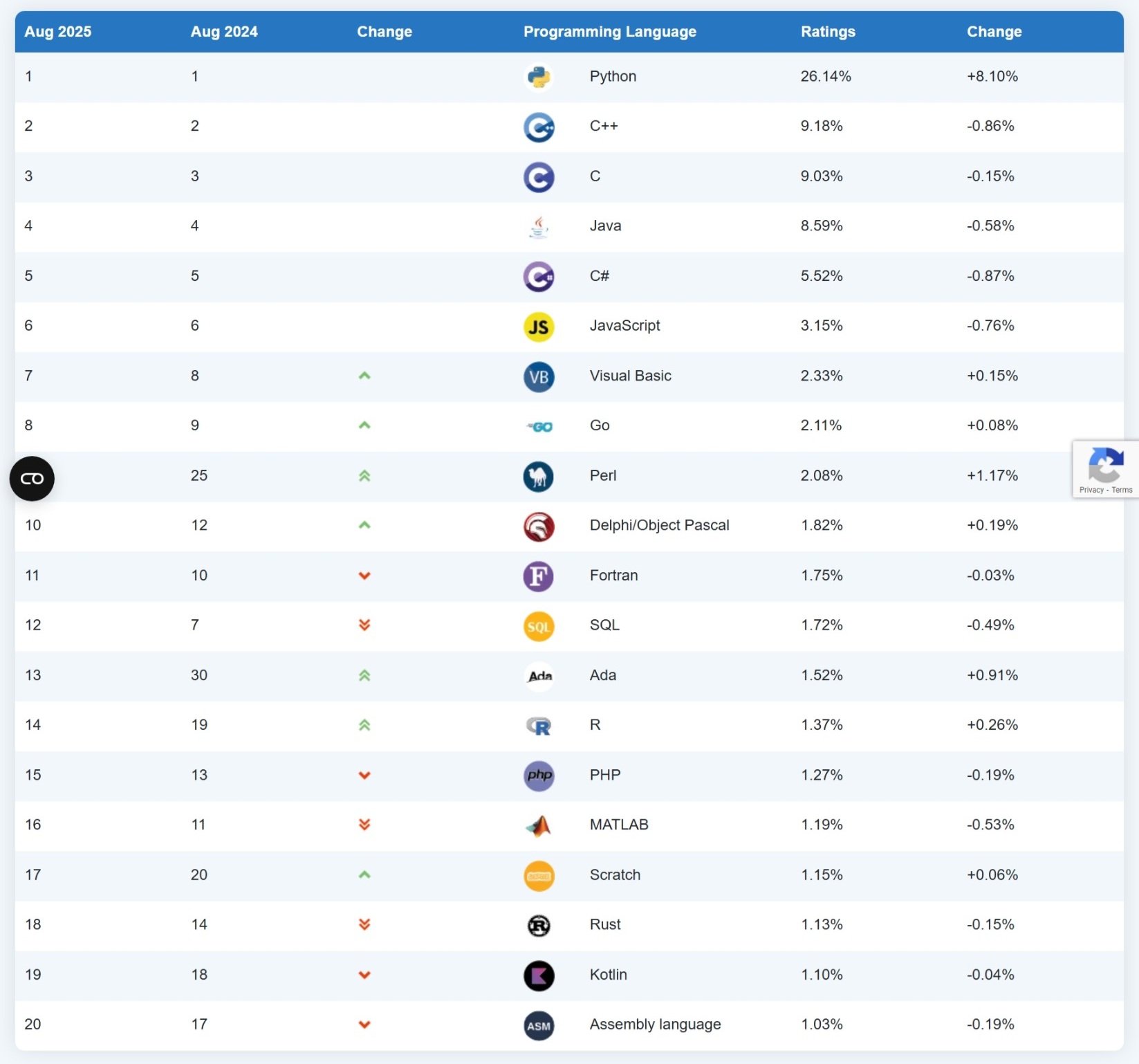What’s in play now? As of August 2025, the programming scene is powered by AI, cloud-native infrastructure, high-performance systems, and evolving web/mobile frameworks.
1. Python – The AI & Data Workhorse
-
Why it still wins: Top-ranked in the August 2025 TIOBE Index TechRepublicAccio, Python leads in popularity. PYPL also places Python at the front with ~30% share globally PyPI Labs.
-
What powers its staying power: Ubiquitous across AI/ML, automation, web backends, scripting, and scientific computing. A massive ecosystem supports frameworks like TensorFlow, PyTorch, and FastAPI Wikipedia TIOBE.
-
Real-world demand: Employers prize it across industries—from startups to Big Tech. Salary benchmarks show strong returns, especially for AI and data science roles IT Pro.
Best for: AI/ML practitioners, automation experts, backend developers, data scientists.
2. Rust – Safety Meets Performance
-
Growth story: Rust climbed to a TIOBE all-time high (~1.47%) and is consistently voted the "most admired" language up to 2025 GitHub.
-
Adoption: Used by AWS (Firecracker), Microsoft (Azure IoT, WebAssembly modules), Cloudflare, Dropbox, Discord, and more.
-
Why it matters: Offers memory safety without garbage collection, blazing performance, and is a go-to for systems, blockchain, and WebAssembly.
Best for: Systems engineers, performance-critical applications, blockchain, embedded and WebAssembly developers.
3. TypeScript & JavaScript – Web Development Staples
-
Web ubiquity: JavaScript remains central to frontend and backend apps; TypeScript is increasingly the standard for large-scale, typed projects Nucamp Lemon.io.
-
Trends: TypeScript surpassed Java on GitHub and is dominant for enterprise-level web coding Accio.
Best for: Full-stack developers, web app builders, and those leveraging modern frameworks.
4. Go (Golang) – Concurrency & Cloud Efficiency
-
Standing strong: Go stays in TIOBE’s top 10 and is prized for its simplicity, concurrency, and built-in tools. GitHubNucamp.
-
Typical usage: Backbone of cloud-native tools like Docker and Kubernetes; ideal for microservices, APIs, and tooling.
Best for: Cloud engineers, backend and infrastructure developers.
5. Swift & Kotlin – Mobile Ecosystem Leaders
-
Swift: Vital for iOS/macOS development, especially with Apple’s expansion into spatial computing (e.g., Vision Pro).
-
Kotlin: Google’s chosen Android language; Kotlin Multiplatform supports cross-platform development.
Best for: Mobile developers targeting iOS and Android, especially multi-platform work.
6. C++ & SQL – The Finance and Legacy Pillars
-
C++: Still indispensable in high-frequency trading and performance-critical sectors such as finance. Business Insider.
-
SQL: Ubiquitous for querying and managing critical data systems, especially in finance and enterprise roles. Business Insider.
Best for: Quantitative finance, legacy system maintenance, and data-heavy roles.
7. Bonus: Julia, Zig, Elixir, Nim
-
Julia: Strong in scientific computing, HPC, and mathematical modeling.
-
Zig: Positioned as a modern alternative to C for low-level systems.
-
Elixir: Excels in real-time, scalable applications—great for chat systems and fintech.
-
Nim: Syntax like Python, compiled performance—handy for game dev and scripting.
These remain niche but meaningful for specialized domains.
How They Stack Up (2026 Outlook)
| Use Case | Languages to Learn |
|---|---|
| AI / Machine Learning | Python, Rust |
| Full-stack Web Development | TypeScript, Python |
| Systems / Performance / Blockchain | Rust, Go, Zig |
| Mobile App Development | Swift, Kotlin |
| Finance / Legacy / High-Performance | C++, SQL |
| Scientific / HPC | Julia, Python |
| Real-time / Scalable Applications | Elixir |
Tiobe Index 2025

Final Word
The "best" language in 2026 lies at the intersection of what you aim to build and how fast you want to ship.
Python remains a dominant, versatile entry point. Rust shines for safe, low-level performance. TypeScript rules the web. Go embodies simple, scalable backend logic. Swift and Kotlin capture the fast-growing mobile space. C++, SQL, and emerging contenders like Julia and Elixir each hold strategic value in niche verticals.
Pick what aligns with your curiosity and goals—and start building.
